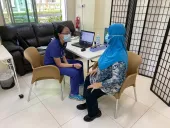
Singapore’s imaging boom
With the rise of chronic diseases and an increasing elderly population in Singapore, the island’s residents are shifting their medical spending strategy towards early disease detection instead of reactive treatment. This bodes well for advanced diagnostic imaging services, which have seen increased demand. These allow Singaporeans to detect a disease before it progresses into the later, deadlier, stages with higher costs.
This preventive thinking will especially drive revenues in the private outpatient diagnostic services market, which is projected to have a compound annual growth rate of 13.5% between 2013 and 2019, says Poornima Srinivasan, healthcare consultant at Frost & Sullivan. Market earned revenues are estimated to grow from US$127.8 million in 2013 to US$273 million in 2019.
“Both patients and healthcare givers are seeking solutions that can aid in early diagnosis and regular monitoring, which, in turn, is driving the usage of diagnostic imaging services,” says Srinivasan.
In order to deliver more accurate results and a wider variety of tests to Singaporeans, manufacturers of diagnostic image services devices are investing in new technologies – and this will be the name of the survival game for device makers hoping to come out on top.
“Given the competitive nature of the market and end-user desire for novel, high-quality products, diagnostic imaging service providers with innovative technologies will flourish,” says Srinivasan.
With their technology investments, device makers might raise their equipment prices, but Srinivasan warns that making the diagnostic devices too expensive could backfire. Hospitals and laboratories are already somewhat constricted by the high capital expenditure on equipment, she says, and are also deterred by the related service and maintenance costs and lack of insurance reimbursement coverage.













 Advertise
Advertise













